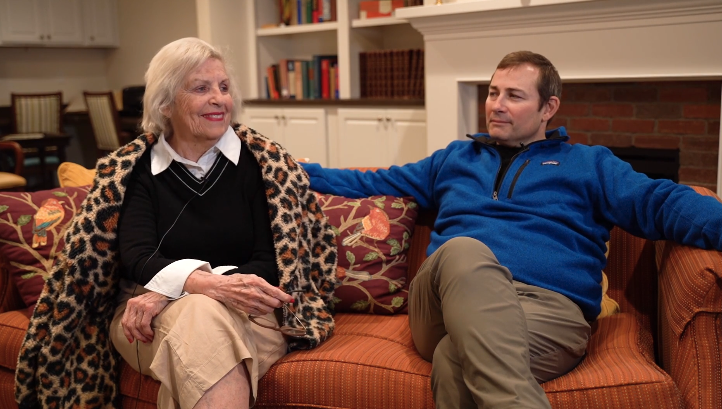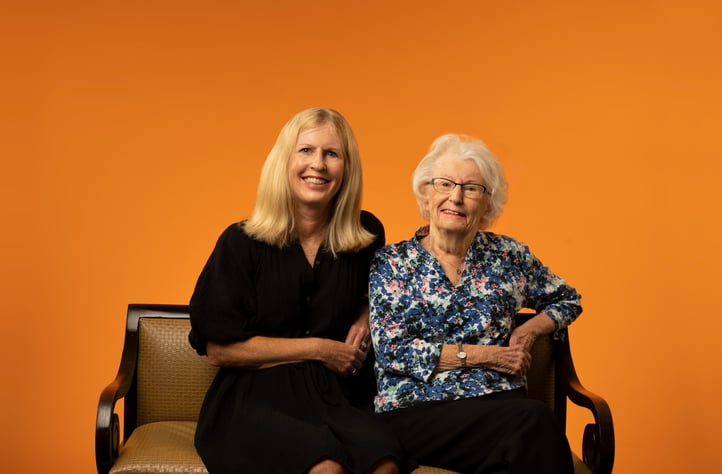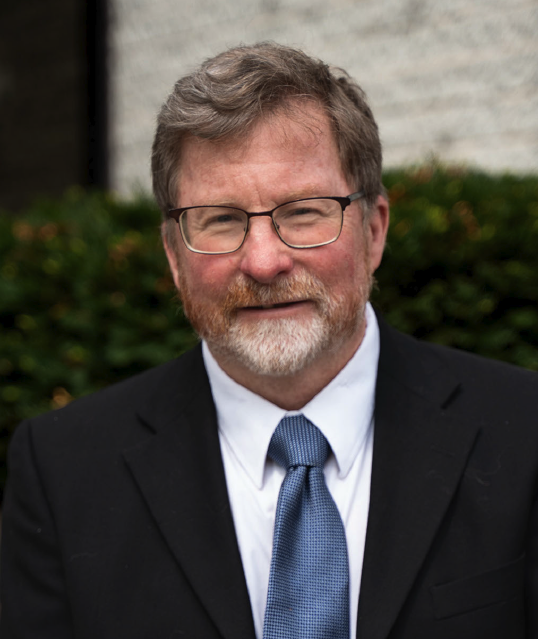For Marjorie P. Lee’s memory care residents, friendships with people living in nearby apartments add joy to their lives, and also help stimulate their minds in ways that weren’t happening before they moved in, at least for most.
Josh Freid has seen the benefits the move has had for his mother, Patty Freid. Her new friendships make her days far more lively than when she was living alone in a suburban condominium with a paid caregiver.

Patty and Josh Freid, a Marjorie P. Lee resident and her son.
Fun with friends
“Very quickly after she got there, she met a guy named Paul, they've kind of become pretty close,” Josh said. “I think they're seeing each other almost every day.’
Also, “She enjoys hanging out with the girls, going to activities,” Josh said. “She enjoys her personal time as well.”
Before she moved in, Patty’s family had a salaried caregiver living with her condominium. “But she is exposed to a great deal more socialization now than before, and also, our mother needed a higher level of care,” Josh said.
He’s pleased she now enjoys life with friends, and the fact that when she needs something, or they want to get together, she’s only about 5 minutes from his Mount Lookout home.
“When I see my mom, she's bright, she's happy,” he said. “She's usually in a good mood, and when she's not, she's usually easy to get out of a bad mood if she’s in one.”
Family members of other Marjorie P. Lee residents enjoy seeing their loved ones sharing friendships.
Memory care residents live on a secured floor because people with dementia sometimes wander off and get lost. Aside from that, Marjorie P. Lee Health Services Administrator Anthony Williams says it would be difficult to tell the difference between the homey places memory-care residents live and those who live independently elsewhere on the premier retirement campus, located about a block from Hyde Park Square.
Friendships help keep the brain active
Laura Dolle also is pleased her mother, Betty Zwicke, has found friends as a Marjorie P. Lee memory-care resident. Betty had become lonely in her apartment after her husband passed away.
“I'd say what my mom likes best about living at Marjorie P. Lee is the friends she's made,” Laura said. “She has a really good friend, Jean. And they do SAIDO together. I think that's a wonderful thing to help with memory.”
SAIDO is a program, developed in Japan, where participants spend about 30 minutes a day doing simple reading, simple math and other tasks that research has found to decrease cognitive decline, and in some cases has helped people regain their fun personalities and become more social.
RELATED BLOG: SAIDO program helps memory-care residents
Just as physical health is important, so is socializing, so people aren’t isolated, and they’re happy, Anthony said.
Marjorie P. Lee has been very intentional about locating memory-care residents in households where they will thrive, “and really have a mutually beneficial relationship” with fellow residents, he said.
Tracie Martella, a nurse team leader at Marjorie P. Lee, said that work of placing residents where they best will make friends, has worked: “They’ve all bonded with someone,” she said.
Friendships are so important that they have taken center stage – Marjorie P. Lee’s care is based more on the social aspects, instead of a traditional health-care situation “with some socialization opportunities,” Anthony said.

Laura Dolle and her mother, Marjorie P. Lee resident Betty Zwicke.
Like Betty Zwicke, Patty Freid also does SAIDO, and Josh believes he has seen her mental sharpness increase. For example, when her cable provider changed, she had difficulty working the television and finding her shows. That’s something many older adults find difficult.
Now, “She's learned how to do it,” Josh said.
She also enjoys her relative independence of being able to stay in her apartament if she wants to. She’ll hang out there with coffee and watch TV if that’s what she’s feeling.
Patty’s family shopped around
Patty Freid years ago was a nurse manager of a former Episcopal Retirement Services memory care unit, and still knew some team members who work at Marjorie P. Lee.
Her family visited several other properties and were struck by the great variety, in the campuses and the differences in happiness of the residents.
Marjorie P. Lee offers a good deal of programs for memory-care resients, which helps them. But also very important is what the residents do among themselves and for themselves, Anthony said.
He said it’s very pleasing to see residents leave an event or a meal and go to a common area and watch TV together, or do something else together.
“When they’re initiating that on their own, as opposed to us taking that up to initiate it, I think that speaks volumes,” Anthony said. “We develop those relationships, and it feels like a home, more than a health-care setting.
Episcopal Retirement Services’ person-centered approach makes a difference in the lives of residents and the team members who care for them.
RELATED BLOG: 5 Questions to Ask When Choosing a Residential Memory Care Community
Residents become so close, “They advocate for each other, too,” Tracie said. “If there's a concern, or someone's upset, or whatever the case, they look out for each other, which is a nice thing.
And there’s nice variety for residents.
“I believe that having people there to be able to do things with, talk to, chat with has been helpful for her,” Josh said about his mother. “She kind of goes back and forth between hanging with the girls and hanging with her guy friend. And you know, it's kind of nice for her to have that mix.”
Benefits for residents’ families, as well
“For me, it feels great to know that I can just come over and be a son and I don't have to micromanage things,” Josh said. “That's nice.”
And if Patty is feeling lonely, or just wants to get out for a while, Josh can pick her up and in just a few minutes, and be sharing a meal or family time with her, he said.
Marjorie P. Lee, a premier retirement community, is a continuing care retirement community (CCRC), meaning residents move into independent-living apartments, but can transition to assisted living, Memory Care or skilled nursing situations if the need arises.
To schedule a tour of Marjorie P. Lee, contact Jennifer Schlotbom at 513-533-5000 or jschlotbom@erslife.org.












